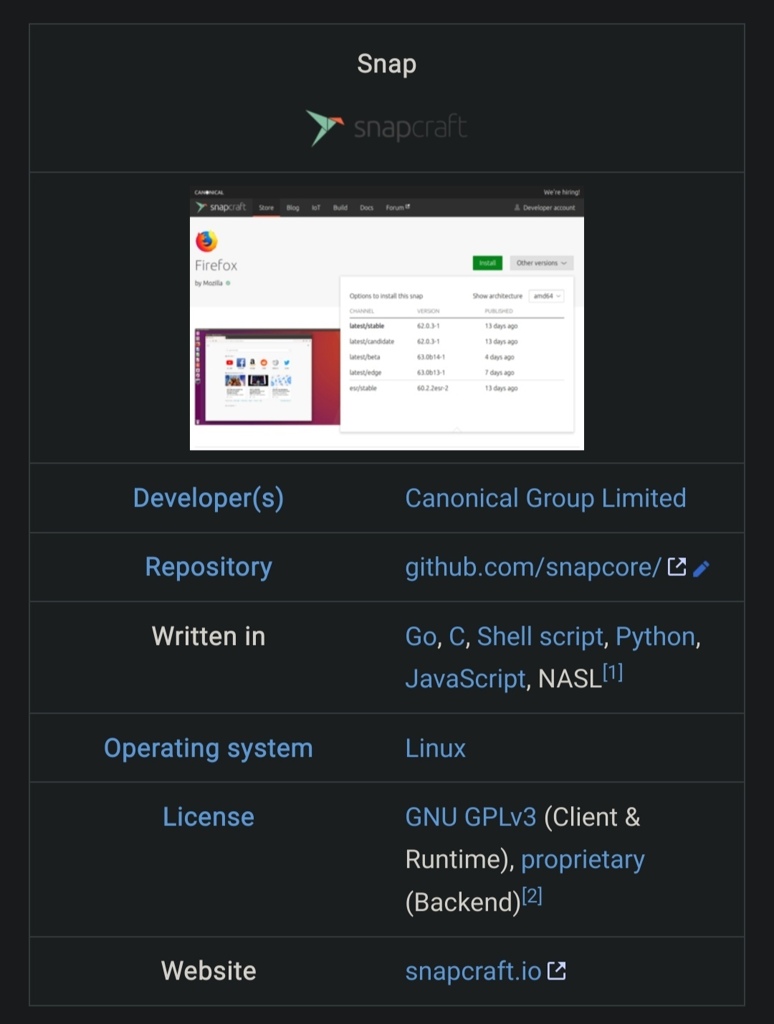It’s not that successful if the userbase hates it and would rather use a competitor.
For me it was a successful deterrent. Debian bookworm has been wonderful.
Yeah I love it, Debian feels like opening a featureless gray box that just says “OS” on the front. Add whatever you want. A blank canvas. It’s as close to “generic” Linux as you can get.
I installed mint on my second PC, and it’s great. I feel like migrating my main, but I’m not sure it would go smoothly. I’ve had a lot of issues with my four months old Ubuntu install, lately the keyboard is nonfunctional at the login screen about half the time. Snaps are another reason making me want to leave it behind.
I don’t mind Snaps in a vacuum, but the unforgivable thing is that they messed with the package repo so that instead of installing a deb package as I intended, it installs a Snap stub which I did not want. If Canonical hadn’t forced them on users in that way, I’d have been fine with them.
Instead, back to Debian I went (sorry I ever left, actually)
I mean I used to used to use Ubuntu for my server now I use Debian cos fuck snaps.
Ow! My brain!
So I didn’t realize that the snaps logo is an origami bird.
“It was like a piece of self-opening origami, or a rosebud blooming into a rose in just a few seconds. Where just a few moments earlier there had been a smoothly curved black disk, there was now a bird. A bird, hovering there.” - Douglas Adams, describing the Hitchhiker’s Guide, Mk. II, from Mostly Harmless.
A bit on the nose there, Canonical.
Same, I used to always pick Ubuntu to spin up servers. Now I pick it never.
The other day I tested Ubuntu just to see if it had gotten any better. It has become worse.
Same, Debian is the way to go (for servers, I can’t stand it on desktop)
It’s not successful though. Like, maybe if your measure of success is that it’s usable, sure. But no other OSes have adopted it. Not even Ubuntu’s downstream OSes like Mint or Pop_OS!.
Users don’t like it, vendors don’t like it, other OS maintainers don’t like it. I’m not sure why that would be considered successful.
Correct me if I’m wrong but Ubuntu is the mostly used Linux desktop OS out there so I wouldn’t call it unsuccessful.
Edit : I’m an idiot I can’t read snaps are not successful Ubuntu is
Hm. And you’d give Snaps the credit for that?
that’s not relevant here although It would be even more successful without snaps imo
successful project
That is a very biased claim. It’s like saying that the PS5 is the most successful gaming platform because God Of War: Ragnarök and Ghost Of Tsushima players prefer it over Xbox and PC.
Did they say it’s the most successful project? Because Sony saying that the PS5 is a successful platform because players prefer it over other options doesn’t seem biased at all. It’s just an objective statement of fact
If you go to snapcraft.io, you can see snap being installed on many other distributions other than Ubuntu. It will not show you the exact numbers, but people willingly install it on their machines. I think that’s successful.
I don’t think “there exists an unknown number of non-Ubuntu machines with snap installed” is a valid metric when the general sentiment seems to be apathy. It’s popular for the same reason Internet Explorer was popular – it’s forcibly installed with the default OS.
If the numbers were favorable, Canonical would release them.
What is the “general sentiment” tho? Sure, on Lemmy and Reddit communities I usually see people hate Snaps, but that’s just a few thousands of people. Another metric of success could be developers maintaining their software as snaps. You will find that quite a lot of them do so.
I said “apathy”, not “negative”. The people who dislike snap have likely moved to other distributions, and I don’t see any widespread praise considering Ubuntu’s market share within the Linux ecosystem, so the most likely answer is that people either don’t know or don’t care about snap.
Whether or not an application is packaged as a snap is also a poor indication. Most of the software used in Ubuntu still comes from an APT repo, mostly official or sometimes a PPA. Many developers distribute their software exclusively as flatpaks, appimages, or binaries. Shit, Valve even recommends against using the snap version of Steam. By using your standard, snap would be considered an abject failure.
Snap doesn’t really even have as many applications packaged as people think. Snap’s package count is often touted as being much higher than Flatpak’s. However, this is misleading, as Snap allows the inclusion of many command-line interface (CLI) only packages that aren’t well-suited for containerization.
The inclusion of these CLI-only packages drastically inflates Snap’s overall package count, while Flatpak does not include as many standalone CLI tools.
Furthermore, packaging CLI tools as Snap or Flatpak packages doesn’t really make much sense. A huge amount of CLI tools were never intended to be used inside a containerized environment like Snap. As a result, there will likely be compatibility issues and unsupported edge cases.
Additionally, there are already established universal packaging standards for CLI tools, such as Nix and Homebrew. These packaging systems are better suited for distributing standalone CLI applications compared to containerized formats like Snap and Flatpak.
I know why I hate snap, no confusion here.
If you don’t like snaps, don’t use the distribution by the company who tries to establish them.
And also warn newcomers not to invest time into those distros.
Exactly. I hope pop moves away from ubuntu at some point though.
I agree, have seen so many people trying to document how to “desnap” Ubuntu and wondered why bother, you are fighting against what is now the whole point of Ubuntu while trying to use Ubuntu while so many other options exist.
I do happily encourage folks to explain why they left Ubuntu behind as I did (snaps). No confusion, just a reiteration of disappointment that they went from being my favorite distro to completely off my list with the snap stuff.
They also called unity successful at some point
Unity was a nice DE. Being on KDE since 12 years, I still miss some of its features, e.g. merging the menu items with the title bar.
Yeah, I was pissed when they went away from it. It was great for small screen devices.
And yet they abandoned it.
At least you could use a different desktop if you didn’t like it.
Nix, guix, flatpak, and OSI images are all better “universal” packages managers on sheer technical merits while also not be a vendor locked proprietary solution.
Snaps are worse than what Redhat is doing.
Sheer* probably. Unless there a technical merit about cutting stuff.
Thx!
Np. We programmer types gotta help each other keep docs sharp ;)
Also than*
MR accepted. Thx!
snaps are a proprietary vendor-locked format, the only redeeming quality is being able to run them in cli (once Flatpak get that too, there is no valid reason for snaps to exist).
I just find it midly infuriating (if that even is a thing, meaning I hate it but it’s not that significant for me to distro hop on my work laptop) to have two “universal” package formats on my system with Canonical shoving the objectively worse one (from a free/libre pov) down my throat…
(once Flatpak get that too, there is no valid reason for snaps to exist).
They said they will not fix it due to “security concerns”
I’ve used flatpak only once, but I am pretty sure I ran it through the cli. Did I imagine that? i might have imagined that, it was a while ago
no you didn’t, you can install flatpak using the terminal but iirc flatpak are mostly made with GUI applications in mind, while snaps support installing command line utils quite well
Ah, fair enough, probbaly me misremembering then
What utter BS. Stop spreading FUD from others. A simple search would find the source code https://github.com/snapcore/
Snaps are open source, including the store.
…no?
The backend is proprietary and you or other orgs cannot run their own server. It’s harcoded to use Canonical’s servers for obtaining snaps and their metadata…

seething Ubuntu fans are funny af lol.
Your leash being longer than average doesn’t remedy the fact that you’re still tied to a pole…Can I self host the official snap server, and use it with an unmodified client? If not, it’s proprietary.
Former Unix security chief.
Do not use snaps. Risky as hell.
Why? I’ve heard this for years at this point, but as someone who rarely uses snaps because they’re the only convenient option for software I’m using, I’m generally ambivalent about them.
People seem to hold really strong opinions about snap but I’ve never been able to get a straight answer, just a bunch of hand waving.
Mainly the snap client doesnt let you configure a secondary source, and ubuntu’s repo doesn’t have a good track record of not providing malware.
https://baronhk.wordpress.com/2023/10/01/malware-in-the-ubuntu-snap-store-again/
https://www.linuxuprising.com/2018/05/malware-found-in-ubuntu-snap-store.html
So that’s admittedly not a good look for canonical, but my read of that is that if you’re getting widely-known software from a developer who’s publishing it to snap themselves, and you’re cautious about your usage, snap is fine.
For example, essentially my only use of snap is to install certbot. If I follow the directions from certbot.eff.org precisely, then I’ll get certbot installed and no issues.
I certainly agree that (a) the system is ripe for abuse and (b) should be self-hostable to support Free software. Both of these could be fixed by canonical opening it up.
My biggest hit was when they pushed browsers to snaps, and I couldn’t do some of my school projects because my school stuff was on a separate disk that the snap was not allowed to access. (Had to use o365, and wasn’t installing windows to write my papers)
In short, it messed up my workflow.
“Successful”
I’d be curious to see some statistics on how many Ubuntu users removed snaps vs how many haven’t changed the default.
I’d bet most ubuntu user don’t know the difference between snap and deb, tho.
I didn’t until apps started breaking. The snap version of steam, Firefox, and Unity (I think?) all started to have issues. When I googled around people would often ask “deb or snap”? I uninstalled the snap packages and installed the deb packages and most of my issues went away.
I ultimately switched to Linux Mint because I kept having stability issues and I was just desperate for a solution. But snap was not a great experience for me.
It would of been a little less bad if they hadn’t forced it on everyone over night. It also didn’t help that it had a ton of complexity and overhead.
I didn’t use Flatpak for the longest time as I was scared from years prior.
Exactly, wouldn’t most of the people who really care already have moved on from Ubuntu?
The reddit Steve method
I remove that abomination every chance I get.
I removed it and it was a pain.
The one app I can’t stand as a snap is firefox, it took a minute to navigate to the first webpage every time I start up. The rest are or more less fine I think, but flatpak meets my needs for most other applications.
Also command line tools are terrible as snaps. And the worst part is you have no idea why they won’t work. It doesn’t tell you that snap is the problem. It just doesn’t work.
It look me about two hours to realize that snap was the problem when I was trying to run Mastodon in a Docker container. That was the last straw before I moved to Fedora.
Snap can’t read anything outside of the
/homedirectory, and there’s no way to fix that except changing the source code and recompiling it.
When Mozilla provide the firefox deb package - Why not give it then? IMO snaps/flatpacks are slower to start, can’t be updated while running, takes more diskspace, and takes longer time to update. With the isolation we also have different kind of problems - have you given it the correct permission?, and how do you get keepassxc browser extension to work with it(they dont support it)?




















